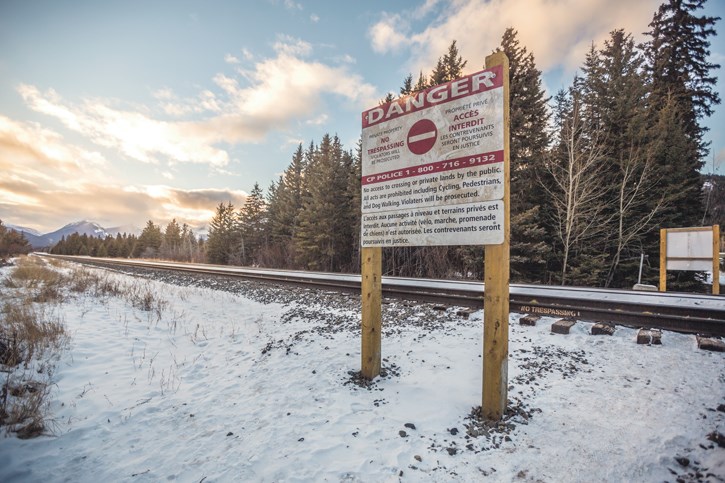BANFF – Concerns over an illegal pedestrian crossing on the train tracks have temporarily derailed a call for Canadian Pacific Railway to stop trains blowing their whistles through town.
In an email to the Town of Banff, the railway giant said it is unlikely to support ceasing the train whistle through Banff given ongoing trespassing as a shortcut between the industrial compound and the townsite.
As a result of CP’s Nov. 17 email, Banff town council unanimously voted to delay an engineering audit to consider having the whistle stopped until an engineered solution – such as an overpass or signalized at-grade crossing – to the trespassing problem is resolved.
“Safety has to be the top priority,” said Mayor Corrie DiManno during council’s meeting on Monday (Dec. 13).
“We’ve heard from the expert CP that they need to be able to have that whistle so that folks know that the train is coming, particularly at that illegal crossing.”
During discussions on potentially stopping train whistles, it was discovered that Parks Canada is the road authority for the crossing at Compound Road, and therefore responsible for considering the whistle cessation process there. The Town of Banff is the road authority for the crossing at Norquay Road.
In the email to the Town on Nov. 17, Canadian Pacific Railway indicated both crossings should be able to qualify for whistle cessation based on Transport Canada’s guidelines.
Should the municipality wish to continue with the process, CP said the next step for the Town of Banff would be to hire a qualified engineering firm to conduct a compliance audit to ensure the crossing meets all standards such as road markings and signage.
Having said that, CP went on to say that because of the existing trespassing problem at approximately mile 81, between the two crossings, the company would not support whistle cessation at this time because of the “high-risk behaviour.”
“Despite measures taken by the railway and the Town to prevent trespassing, pedestrians may still choose to cross the railway right of way,” said Pete Bayerle, senior manager of projects and public works for CP in the email.
“Given the distance to the existing at-grade crossings, it is unlikely a pedestrian would hear the safety measures at those crossings as they activate for an oncoming train, meaning the whistle is the only notice they have of any oncoming trains.”
Bayerle said it should also be noted that anyone using this route needs to cross both the CP main track and a siding track.
He noted CP runs, on average, 20 trains daily through the area at a speed of about 65 kilometres per hour.
With current train operations, he said CP may also have trains parked on either track meaning the pedestrian using the trespass option may attempt to crawl over/under/through the parked train.
“This is incredibly dangerous for a number of reasons, including loss of limbs or life if the parked train they are trying to get through/over/under starts to move; and crawling over/under/through the parked train only to get hit by a moving train on the other side,” he wrote.
Chris Hughes, the Town of Banff’s director of corporate services, said CP and the Town would have a chance to review and discuss the findings of the audit – estimated to cost about $8,000 – once completed.
“What administration is recommending is we hold off on that audit until such time as we’ve determined how best to address the illegal pedestrian trespassing that we know happens in between the two level crossings adjacent to our town,” said Hughes.
CP’s preferred option to deal with the trespassing problem between the compound and town is a multi-million dollar pedestrian overpass, which needs to be 200 metres long and more than seven metres high for clearance for the double railcar trains. However, at its Nov. 22 meeting, council wasn’t ready to commit to that or the less expensive option of an at-grade signalized crossing at the location until getting additional clarity from CP and Parks Canada.
Councillor Chip Olver said the Town is in a conundrum in trying to find a resolution to this issue.
“I just was hoping we could move forward a little bit with it to give hope to the people who would very much like to have the train whistle not blow anymore, just to continue that research,” she said.
“But I understand it doesn’t make sense to go ahead and start on this process until we’re further along.”
Tony Clevenger, a Banff resident and well-known Banff wildlife scientist, is leading a campaign for a quiet zone in Banff.
He has said noise from train horns is highly intrusive and can impact people’s physical health and well-being and can cause a range of physiological and behavioural responses in wildlife.
Clevenger was not immediately available for comment.




